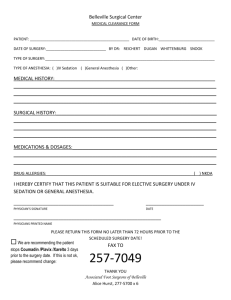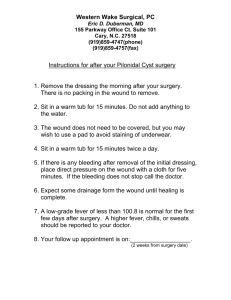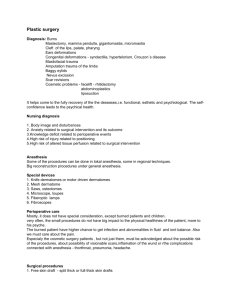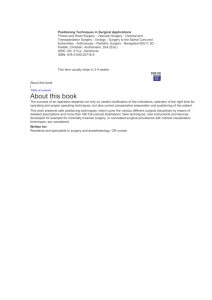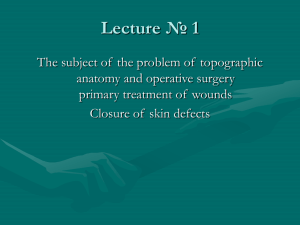Information on Peri-operative Care We are Here to Care for YOU
advertisement
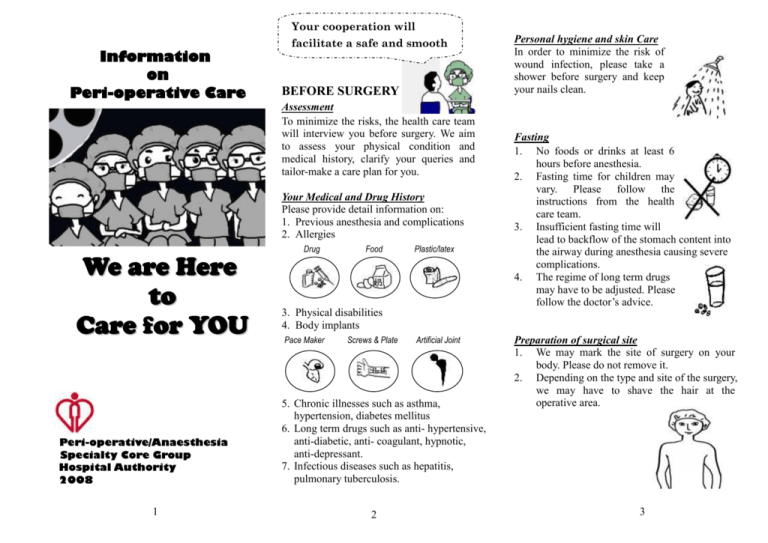
Information on Peri-operative Care Your cooperation will facilitate a safe and smooth surgery BEFORE SURGERY Assessment To minimize the risks, the health care team will interview you before surgery. We aim to assess your physical condition and medical history, clarify your queries and tailor-make a care plan for you. Your Medical and Drug History Please provide detail information on: 1. Previous anesthesia and complications 2. Allergies We are Here to Care for YOU Peri-operative/Anaesthesia Specialty Core Group Hospital Authority 2008 1 Drug Food Plastic/latex Personal hygiene and skin Care In order to minimize the risk of wound infection, please take a shower before surgery and keep your nails clean. Fasting 1. No foods or drinks at least 6 hours before anesthesia. 2. Fasting time for children may vary. Please follow the instructions from the health care team. 3. Insufficient fasting time will lead to backflow of the stomach content into the airway during anesthesia causing severe complications. 4. The regime of long term drugs may have to be adjusted. Please follow the doctor’s advice. 3. Physical disabilities 4. Body implants Pace Maker Screws & Plate Artificial Joint 5. Chronic illnesses such as asthma, hypertension, diabetes mellitus 6. Long term drugs such as anti- hypertensive, anti-diabetic, anti- coagulant, hypnotic, anti-depressant. 7. Infectious diseases such as hepatitis, pulmonary tuberculosis. 2 Preparation of surgical site 1. We may mark the site of surgery on your body. Please do not remove it. 2. Depending on the type and site of the surgery, we may have to shave the hair at the operative area. 3 Other information 1. Please remove the followings before surgery: * Detachable dentures: dislodged dentures may cause airway obstruction. * Spectacles / contact lens: to prevent eye injuries * Metal ornaments such as rings, bracelets, necklaces, watch, earrings & hairpins: to prevent electricalinjuries * Cosmetics, nail polish, or artificial nails: to facilitate clinical observations 2. Please inform the health care team if you have loose tooth. 3. On the day of surgery, if you feel sick, such as fever, cough, sore throat, running nose, diarrhea, nausea and vomiting, please inform the health care team for reassessment. 4. Please urinate before entering the operating theatre. Gentle Reminder Smoking cessation can reduce the risk of complications after surgery. DURING URGERY Your safety is our main concern. We, as a team of healthcare professionals, will strictly monitor the operative environment and to ensure the sterility of surgical instruments at all times. We will provide the best care for you throughout your stay in the operating room. 1. 2. Correct surgery To ensure correct surgery is done for you, we will confirm your identity and required operation at different points of time before the procedure starts. Position for surgery Health care team will put you into the required surgical position. Please relax and cooperate with us. Discomfort You may experience some discomfort such as headache, sore throat, hoarseness of voice, nausea, muscle pain and tiredness. Please let the nurse know if you do not feel well. Pain Post-operative wound pain is common but can be relieved. The nurse will assess your pain level and provide pain killers accordingly. Surgical Wound The size of the surgical wound varies with different operations. The wound will be closed with either stitches or staples which will be removed a few days later, if needed. Follow-up Visit We may visit you later according to individual condition. AFTER SURGERY You may be transferred to the recovery area for observations. Vital Signs Monitoring This includes blood pressure, pulse, oxygen saturation, body temperature and wound condition. Oxygen therapy Oxygen may be administered through nasal cannulae or face mask to enhance your oxygen saturation. Please relax and breathe deeply. The information is subject to change without notice. For details, please contact your healthcare professional. 4 5 6
